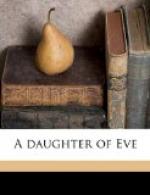Her exclamations, and also her reticences on the subject of her sons, were equal to the most lamenting verses in Jeremiah, and completely deceived the sisters, who supposed their sinful brothers to be doomed to perdition.
When the boys were eighteen years of age, the count gave them rooms in his own part of the house, and sent them to study law under the supervision of a solicitor, his former secretary. The two Maries knew nothing therefore of fraternity, except by theory. At the time of the marriage of the sisters, both brothers were practising in provincial courts, and both were detained by important cases. Domestic life in many families which might be expected to be intimate, united, and homogeneous, is really spent in this way. Brothers are sent to a distance, busy with their own careers, their own advancement, occupied, perhaps, about the good of the country; the sisters are engrossed in a round of other interests. All the members of such a family live disunited, forgetting one another, bound together only by some feeble tie of memory, until, perhaps, a sentiment of pride or self-interest either joins them or separates them in heart as they already are in fact. Modern laws, by multiplying the family by the family, has created a great evil,—namely, individualism.
In the depths of this solitude where their girlhood was spent, Angelique and Eugenie seldom saw their father, and when he did enter the grand apartment of his wife on the first floor, he brought with him a saddened face. In his own home he always wore the grave and solemn look of a magistrate on the bench. When the little girls had passed the age of dolls and toys, when they began, about twelve, to use their minds (an epoch at which they ceased to laugh at Schmucke) they divined the secret of the cares that lined their father’s forehead, and they recognized beneath that mask of sternness the relics of a kind heart and a fine character. They vaguely perceived how he had yielded to the forces of religion in his household, disappointed as he was in his hopes of a husband, and wounded in the tenderest fibres of paternity,—the love of a father for his daughters. Such griefs were singularly moving to the hearts of the two young girls, who were themselves deprived of all tenderness. Sometimes, when pacing the garden between his daughters, with an arm round each little waist, and stepping with their own short steps, the father would stop short behind a clump of trees, out of sight of the house, and kiss them on their foreheads; his eyes, his lips, his whole countenance expressing the deepest commiseration.




